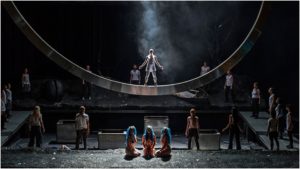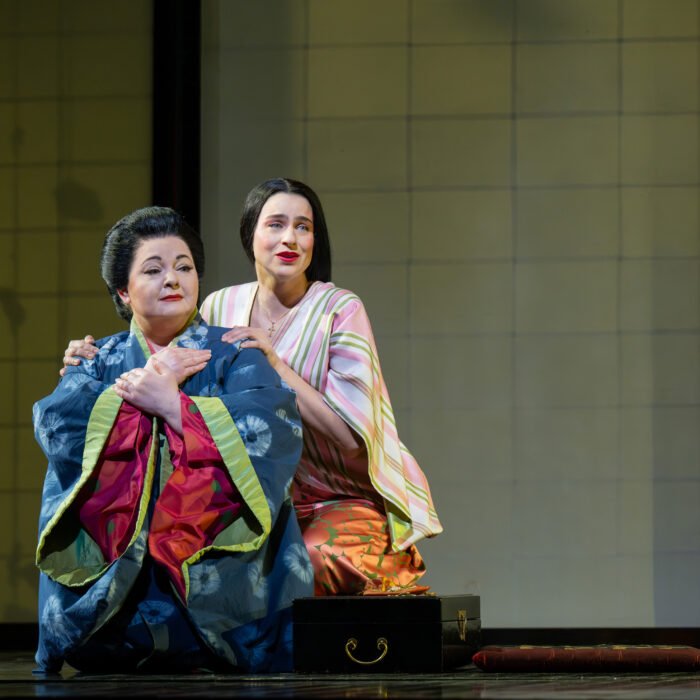
Royal Opera House 2018-19 Review: Der Ring Des Nibelungen
Wagner’s Ever-Vibrant Genius Trumps An Unimaginative Production
By Nina Krauthamer & Charles BlumWe had the unexpected pleasure of attending the last Cycle of the Keith Warner production of “Der Ring des Nibelungen” at the Royal Opera House, Covent Garden (September 26 through November 2, 2018).
Warner’s production, like most modern productions, had several insightful touches and many silly ones. The performance begins and ends with the Rhine Maidens in a “natural state” – naked – nudity seeming to be de rigueur for new productions.
Leaving Nothing To The Imagination
Costumes were the mix of medieval rags and modern dress, with Alberich and Mime attired as mad scientists. Warner leaves little to the imagination – there is a large crashed plane prominently featured in “Siegfried,” perhaps to explain how Wotan landed on earth from Vallhalla. Siegfried uses the fuel from the plane to heat up the forge. And the mystery of the disappearance of Alberich is solved. In “Götterdämmerung,” he appears to Hagen sucking on a respirator on a hospital bed in a suspended boat – too much time in the mines apparently resulting in Black Lung disease.
There were some surprisingly contemporary touches – the Rhine maidens seemed to be very aware of the #metoo movement. Not only was Alberich’s amorous intentions rebuffed by the Rhinemaidens, they positively beat the stuffing out of him. And – like father, like son – when Hagan grabs the ring at the end of “Götterdämmerung,” the Rhine Maidens beat him up and get it back. A good part of the staging involved what we referred to as the Wall – either rotating and suspended below Wotan’s feet or separating the divine from the human on the fire mountain.
A Ring For Singers
This Ring belonged to the singers. Bass-baritone John Lundgren, despite some issues in the first Ring, had real presence as Wotan. He brought a physicality to the role that we have not seen in other productions.
Baritone Johannes Martin Kranzle, as Alberich, was suitably evil, but less threatening than others portraying the role. He becomes quite querulous – more Mime-like than Mime – after his entrapment and loss of the Ring.
Tenor Gerhard Siegel, as Mime, can safely claim this role as his own. Gunther Groissbock was a wonderful Fasolt, played as a worker with Fafner, sung by Brindley Sherratt, as his boss.
“Die Walküre” was one of the most moving performances we ever heard. Wotan’s narratives were particularly compelling.
Tenor Stuart Skelton, as Siegmund, was in excellent voice and carried the first act. Soprano Emily McGee, as Sieglinde, only came into her own in act three. Soprano Nina Stemme had a warmth and breadth that surpassed her wonderful performance last July in Munich. Her intonation is impeccable.
“Siegfried” was a full voiced energetic and rapid paced production. The first act was well integrated and beautifully staged Lundgren continued to be a pleasant surprise and tenor Stefan Vinke rose to the occasion in the title role. Soprano Heather Engebretson, as the Woodbird, actually appears onstage after descending from the ceiling. However, the mincing over the barbed wire with Siegfried on the way to the mountain was ridiculous.
Brunhilde’s awakening happens behind the Wall, and the door that allows her to enter as a woman slams behind her as she approaches Siegfried. This staging did not allow Stemme to shine dramatically as she did in Munich. We loved Antonio Pappano’s rhythmic sense and forward thrust but unfortunately, he and the orchestra ran away from Stemme at the end of Act three.
Some Mixed Parts
Stemme was her amazing self in “Götterdämmerung.” Her intensity was staggering. She communicated every phrase and was in excellent voice. Danish bass Stephen Milling as Hagen, however, was impressive. He was suitably malevolent and menacing. Of the main trio, it was Vinke, the tenor who didn’t seem up to task with the challenging role of Siegfried.
Karen Cargill as Waltrude was excellent but Pappano took this scene much too slowly. Emily McGee appears here as Gutrune, to some success. Unfortunately, most of the pacing was off and Götterdämmerung never caught fire (no pun intended).
Overall, Antonio Pappano did a creditable job leading the orchestra, although the orchestra had some obvious deficiencies. He tends to keep the opera moving, generally at a rather brisk pace with some surprising and disappointing exceptions. Nothing really packed a wallop and his transitions were indiscernible.
But some of his passages were quite lyrical and we can understand why he has a devoted following in London.


